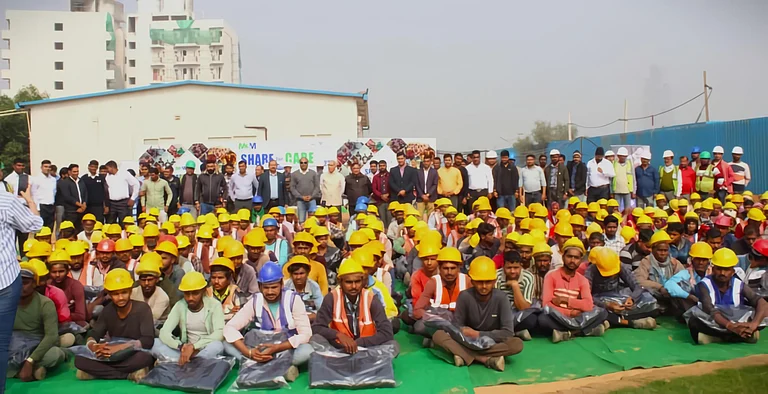Suman Kalyan Ovhal, 42, has toiled her entire life in sugarcane fields, first as a child labourer with her impoverished parents and later as a young teenager with her husband. Yet, in all these years of backbreaking work of cutting the cane and lugging the large bundles on her head, she has never received any cash payment or benefits.
The exhausting labour of women sugarcane cutters like her is described as ardha koyta, or half sickle, in the state’s sugar industry, and has remained invisible and unaccounted for. “We bring sweetness into other people’s homes but our own lives are bitter,” Ovhal sighs.
After years of exploitative practices, Ovhal and women like her from the Marathwada region of Beed district are mobilising politically to make demands of fair-trade bargaining from the government and the elected representatives.
In a first-of-its-kind initiative, 5,000 women sugarcane cutters in Beed, under the aegis of MAKAAM (Mahila Kisan Adhikar Manch), an informal collective of women farmers, have released a manifesto, listing their demands for equal payment, maternity leave and education for the children. They have decided to vote collectively for a candidate who will recognise their problems and act on their demands.
Activists have charged that under the current BJP-Shiv Sena-NCP government in the state, workers' conditions have deteriorated due to high inflation and stagnant wages. Moreover, their fight for equal rights has been curtailed as they are unable to carry out mass demonstrations and rallies.
“Ours is not only a labour issue but also a gender one. We are exploited in the male-dominated system by the contractors, our fathers and husbands. And there is no one in the government to take cognisance,” says 27-year-old activist Kranti Khalge.
Maharashtra has 14 lakh sugarcane workers, nearly half residing in Beed district alone. “Women constitute half of this number which is roughly three lakh. They are absent from the employment chain and payment, even if their labour helps to cut the canes,” says Manisha Tokale, state core committee member of MAKAAM and in charge of Beed district.
Following the Maharashtra government-appointed Neelam Gorhe committee, district authorities in 2021 began to register sugarcane migrant workers and issue identity cards, through a digital registration process. But other recommendations from the committee on payment, health and social security have remained on paper, Tokale says.
Every year during the season, this population migrates out of Beed to the 190 sugar factories in the state and beyond as labourers in sugarcane fields. Spread across 14 lakh hectares, in Ahmednagar, Kolhapur, Sangli, Satara and Baramati, the mills produced 1,022 lakh tonnes of cane last year.
A majority of these factories are run by political barons, including former Congress chief minister Ashok Chavan, deputy chief minister Ajit Pawar from NCP, late Vilasrao Deshmukh’s son Amit Deshmukh, Hasan Mushrif, Dilip Walse-Patil, Dhananjay Munde, Balasaheb Patil, Prajakt Tanpure, Rajesh Tope, and Balasaheb Thorat, among others.
Tokale says the problem of sugarcane workers is as old as India’s independence and successive governments have shrugged off the responsibility of sugarcane workers because of the conflict with sugar mill owners and their political affiliations. “It is the mandate of the government to look after the social and economic welfare and health of sugarcane workers, as it is of other civilians. But due to the seasonal migration and the remote nature of their work, these workers fall victim to the system’s neglect.”
The cane season begins in October and lasts for six months till April. Mukadam or agricultural contractors hire a husband-wife couple as a jodi (unit) to cut the cane and transport it in tempos and bullock carts to the factory location. It takes around 15 -20 workers to fill a load full of tractors. On average, each factory has a minimum of 5,000 labourers to fill 350 tractors, Tokale said. The entire harvesting process is done manually by the old-school method using a sickle and the cane loads are carried on the head. Ironically, the wage system, too has remained stuck in the pre-modern era.
According to the state’s new guidelines on minimum wage scale for sugar cane cutters, workers must get Rs 366/tonne of cane harvest. A jodi should get at least Rs 742/tonne. But on the ground, the official system is defied with an offer of advance payment, which the jodi can bargain for in return for the work. For instance, a couple can pick up an amount of Rs 60,000 at the start of the season and harvest until they have fulfilled the number of tonnes for that price. “Most of the time, they are only able to work for half that amount and the remaining amount is carried forward as debt. The system is designed in a way, which keeps their labour in a perpetual cycle of debt trap,” Tokale says.
Studies and surveys among the sugarcane labour families revealed dismal human development indicators across, health, education and hygiene. For the entire season, the workers live and work in the sugarcane fields, with no accommodation or health facilities. Nearly 90 per cent of the women spend their pregnancy and labour on the farm. The children born on the farms and those accompanying their working parents have no access to school.
“I have delivered both my kids on the farm. I had to resume cane cutting 12 days after delivering my older child and in the case of the second child, I resumed in four days itself,” recalls Sarika Dongre.
Pregnant women and new mothers lack access to sufficient sources of nourishment and have to rely on millet bhakri and salt. Women interviewed by Outlook said they have spent days eating stale food and are not given enough time to feed their babies. Women who have undergone family planning operations also had to join immediately, even as their stitches were unhealed.
Young girls are made to carry loads of harvested canes on their heads as soon as they start menstruating. During menstruation, the women work through stigma and body cramps. Sanitary napkins are unaffordable and difficult to dispose of on farms, hence rarely used. Most women rely on patches of old cotton sarees, or gunny sacks and fleece cloth as pads.
Chaya Thorat, who suffers from thyroid and has extreme body cramps, says she works through debilitating pain by popping generic painkillers. “If we are unwell and take an off to visit the doctor, we have to pay compensation for our absence by paying the contractor Rs 1000/day.”
To avoid the suffering, pain and shame from pregnancies and periods which obstruct their long working hours, women in Beed started to undergo hysterectomies.
Jayashree Ovhal, 55, from Kathode village, removed her womb, nearly 14 years ago following persistent problems from menstruation. “We barely get one bucket of water for each person to bathe, which is not enough to wash and reuse the cloth. If we went to the well or river stream and spent time to clean it, the contractors would shout and abuse us,” she says. Ovhal retired from cane cutting three years ago due to extreme weakness and hormonal changes.
In 2019, following outrage over media reports on forced hysterectomies, the state government set up a committee led by MLC Neelam Gorhe, to study the problems of women sugarcane workers. As per the data by the state public health department, nearly 13,000 sugarcane workers in Beed in the age group of 36 to 50 years have surgically removed their wombs due to dysfunctional uterine bleeding (DUB), abdominal pain, white discharge and fibroids. Tokale claimed the unofficial number of hysterectomies among female sugarcane harvesters in Beed could be over one lakh.
“The exploitation of women labourers, lack of access to health and hygiene, poor menstruation practices, early pregnancies and malnourishment are all interrelated issues, leading to hysterectomies. The conditions need to improve to such an extent, that not a single woman should feel forced to undergo removal of her womb,” Tokale adds.
Khalge, the young activist, hopes sugar corporations like other labour industries take the onus of labourers and treat them equally. Women should get monthly off, accident insurance and maternity leave, common industry practices for contract labourers. “We are only asking that they accept us as theirs. It is not much to ask,” she says.





















